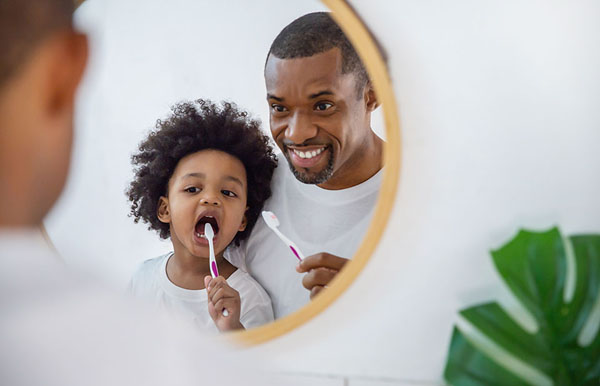Helping Your Child Feel Comfortable and Confident About Dental Visits
As a parent, you want your child to have a positive experience when visiting the dentist, but if your child is scared or anxious, that may feel like a challenge. Dental fear is common among children and can stem from many sources—fear of the unknown, fear of pain, or simply not wanting to sit still in a dental chair. Understanding and addressing dental pain is crucial for managing these fears effectively. Fortunately, pediatric dentists are trained to help children overcome these fears and make dental visits a stress-free experience.
So, how can you help your child feel calm and confident before their next appointment at Thomas W. Kauffman, DDS, PC? Our Atlanta pediatric dentist shares expert tips on how to overcome your child’s fear of the dentist. If you’re ready to schedule a visit, contact our friendly dental practice at (404) 524-1981.
What Is Pediatric Dentistry?
Pediatric dentistry is a specialized branch of dentistry focused on the oral health care of children, from infancy through adolescence. Pediatric dentists are trained to address the unique dental needs of children, including preventive care, diagnosis, and treatment of dental conditions. They have expertise in working with children who may be anxious or fearful, and they use child-friendly approaches to make dental visits more comfortable and less intimidating. Pediatric dentists are also knowledgeable about alternative therapies that can help manage anxiety related to dental visits.
In addition to regular checkups and cleanings, pediatric dentists also provide treatments for cavities, braces, tooth alignment, and other dental issues that can arise as children grow. Their goal is to ensure that children develop healthy oral hygiene habits early on, helping them maintain a lifetime of good dental health.
Understanding Dental Anxiety and Phobia
Dental anxiety and phobia are common conditions that affect millions of people worldwide, including children. Dental anxiety can arise from various factors, such as past traumatic experiences, fear of pain, or simply the fear of the unknown. On the other hand, dental phobia is a more severe form of anxiety that can significantly hinder individuals from seeking necessary dental care. Symptoms of dental anxiety and phobia can manifest as a rapid heartbeat, sweating, and a strong desire to avoid dental visits altogether.
Understanding the causes and symptoms of dental anxiety and phobia is crucial for effective treatment and management. By recognizing these conditions, parents and dental professionals can work together to create a supportive environment that addresses the child’s fears and promotes positive dental experiences. This understanding is the first step towards helping your child overcome their dental anxiety and ensuring they receive the dental care they need for optimal oral health.
Why Are Children Afraid of Dental Anxiety?
Understanding why your child has a dental phobia is the first step in helping them overcome their anxiety. Here are some common reasons children develop a fear of the dentist:
- Fear of the unknown: If your child has never been to the dentist, they may feel nervous simply because they don’t know what to expect.
- Previous negative experiences: Past experiences, even if they were minor, can leave lasting impressions and cause fear of future visits.
- Fear of pain: Children may associate dental procedures with pain, even if most dental treatments are relatively painless.
- Separation anxiety: Younger children may feel anxious about being separated from their parents during the procedure.
- Sensory sensitivity: The sights, sounds, and smells of a dental office may be overwhelming for some children, especially those with sensory sensitivities.
Our pediatric dentists are well aware of these concerns and know how to create a comfortable environment where your child can feel at ease.
Tips for Helping Your Child Overcome Their Fear of the Dentist
Start Early
Introducing your child to the dentist early on can help them become accustomed to the office environment and reduce dental anxiety in the long run. Ideally, according to the American Dental Association, your child should have their first dental visit by the age of one, or within six months after their first tooth appears. Early visits help establish a positive relationship with the dentist and allow your child to get used to the dental setting before they need dental treatment.
Keep It Positive
The way you talk about the dentist can have a big impact on how your child feels. Instead of using words like “pain,” “needle,” or “shot,” try to frame the experience in a positive light. For example, you might mention the positive impact this will have on their oral health, saying, “The dentist is going to help keep your teeth strong and healthy,” or “You’ll get to sit in a special chair and count how many teeth you have.” This helps your child associate the dentist with a fun and positive experience.
Use Books and Videos
Many children’s books and videos explain dental visits in a fun and non-threatening way. Reading a book or watching a video together about going to the dentist can help your child visualize what will happen and alleviate any concerns. Look for stories featuring friendly characters or even other children going through the dental process.
Play “Pretend Dentist” at Home
Play is a great way for children to process their emotions and prepare for new experiences. Set up a “pretend dentist” game at home, where you take turns playing the role of the pediatric dentist and patient. Use a toothbrush, a mirror, and other props to demonstrate what will happen during dental appointments. This can help your child feel more in control and less fearful when it’s time to visit the real dentist. An excellent pediatric dental team will be prepared to mimic those experiences in the office when you visit.
Visit the Dentist for Routine Checkups, Not Only When There’s a Problem
Taking your child to the dentist for routine checkups—rather than just when they have a cavity or issue—helps them view dental visits as a normal, non-threatening part of life. This prevents dental anxiety from building up over time. Regular visits for family dentistry services also allow your child to become familiar with the office and staff.
Stay Calm and Supportive
Dental anxiety affects little ones in different ways, and children are very sensitive to their parents’ emotions. If you’re nervous about stressful dental treatments or anxious about your child’s dental visit, they may pick up on your feelings and become more fearful. Stay calm and reassuring, and avoid showing severe anxiety or hesitation about the visit. Let your child know that you are there for them and that the dentist is friendly and there to help.
Explain the Dental Treatment in Simple Terms
A traumatic dental episode occurs when a young child isn’t aware of what they’re about to experience. Before the appointment, explain the visit in simple, non-scary language. Let your child know what to expect during the dental exam or cleaning. Keep it positive, and reassure them that they will be comfortable and safe. Avoid using words that could create fear, like “hurt” or “needles.”
Bring a Comfort Item
If your child has a favorite toy, blanket, or stuffed animal, bring it along to the appointment or any dental offices for extra comfort. This item can serve as a source of reassurance, especially if your child feels nervous or overwhelmed due to dental anxiety.
Reward Your Child After the Appointment
A little positive reinforcement can go a long way, especially if your little one experiences dental anxiety and phobia. After the appointment, offer praise for being brave and cooperative. You might also consider a small reward, like a sticker or extra playtime, to make the experience feel more positive. In addition, this could make regular dental appointments more fun.
Ask the Dentist About Conscious Sedation Options if Necessary
If your child’s fear is more severe or they have a lot of dental work ahead of them, sedation dentistry may be an option to help them relax and feel more comfortable. Our pediatric dentists can discuss sedation options, such as nitrous oxide (laughing gas) or mild oral sedation, to ensure your child’s comfort during a dental procedure. These options are safe and effective when administered by trained professionals who are happy to help any anxious patients with their dental care.
Tips for Building Trust and Rapport with the Pediatric Dentist
Building trust and rapport with the pediatric dentist is essential for helping anxious patients, especially children, feel more at ease. A pediatric dentist should adopt a gentle and caring approach, taking the time to explain each dental procedure in simple, reassuring terms. This helps demystify the process and reduces fear of the unknown.
It’s also important for the dentist to be attuned to the child’s anxiety levels and adjust their approach accordingly. For instance, they might use a softer tone, offer frequent breaks, or use child-friendly language to describe what’s happening. Creating a positive and supportive experience during dental visits can significantly build trust and reduce anxiety in future appointments. When children feel understood and cared for, they are more likely to view dental visits as a positive experience rather than something to fear.
Creating a Comfortable Dental Environment
Creating a comfortable dental environment can play a significant role in reducing anxiety and making the dental experience more pleasant for children. This can be achieved through various means, such as playing soothing music, using aromatherapy, or simply ensuring the dental office has a warm and welcoming atmosphere.
The dental chair should be comfortable and adjustable to meet the patient’s needs. Pediatric dentists often use visual aids, such as TVs or virtual reality headsets, to distract children during dental procedures. These distractions can help take the child’s mind off the procedure and make the experience more enjoyable. By creating a calming and engaging environment, dental practices can help alleviate dental fear and make visits to the dentist a more positive experience for children.
Relaxation Techniques and Distractions
Relaxation techniques and distractions can be highly effective in reducing dental anxiety for children. Techniques such as deep breathing exercises, meditation, and guided imagery can help calm the mind and body, making the dental visit less stressful. Parents can practice these techniques with their children at home before the appointment to help them feel more prepared.
Distractions, such as listening to music or watching TV, can also be beneficial in taking the child’s mind off the dental procedure. Some dental practices offer conscious sedation options, such as nitrous oxide (laughing gas), to help children relax during their visit. This form of sedation is safe and can make the experience more comfortable for anxious patients.
By working with the dentist to find the best relaxation techniques or distractions, parents can help their children manage their dental anxiety and ensure they receive the dental care they need.
Building Confidence in the Dental Chair
The key to overcoming severe dental anxiety is creating a positive, supportive experience for your child from the very start. By taking these steps, you can help ensure that your child grows up with healthy teeth and a healthy attitude toward dental appointments.
If your child is nervous about their next dental appointment, don’t worry—Dr. Kauffman and his excellent staff are here to help! Our pediatric dental team in Atlanta is experienced in treating children who experience dental anxiety and will go the extra mile with relaxation techniques to make sure your child feels comfortable, safe, and cared for.
To schedule an appointment or learn more about how we can make your child’s dental experience enjoyable, contact our office today at (404) 524-1981.



